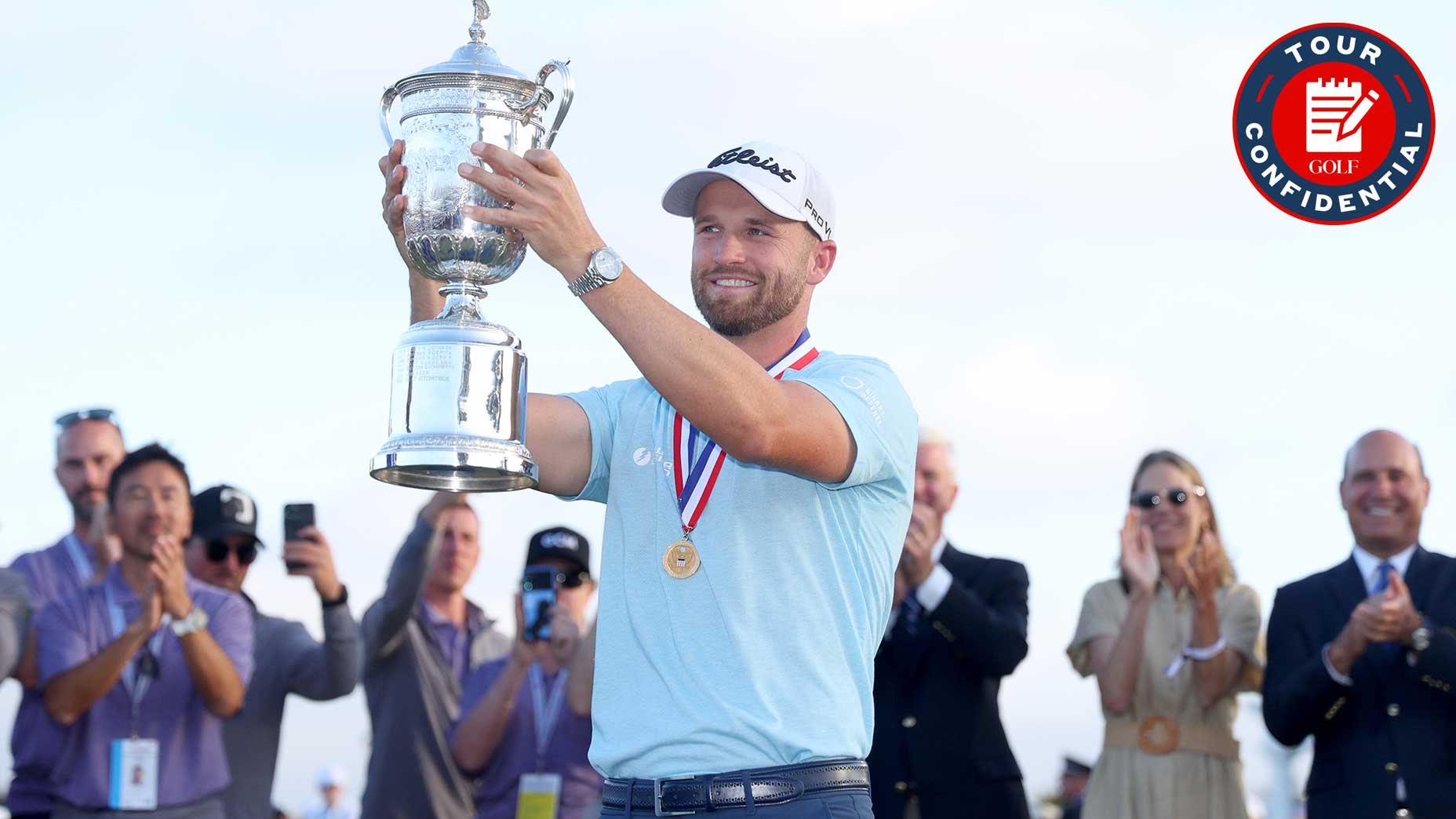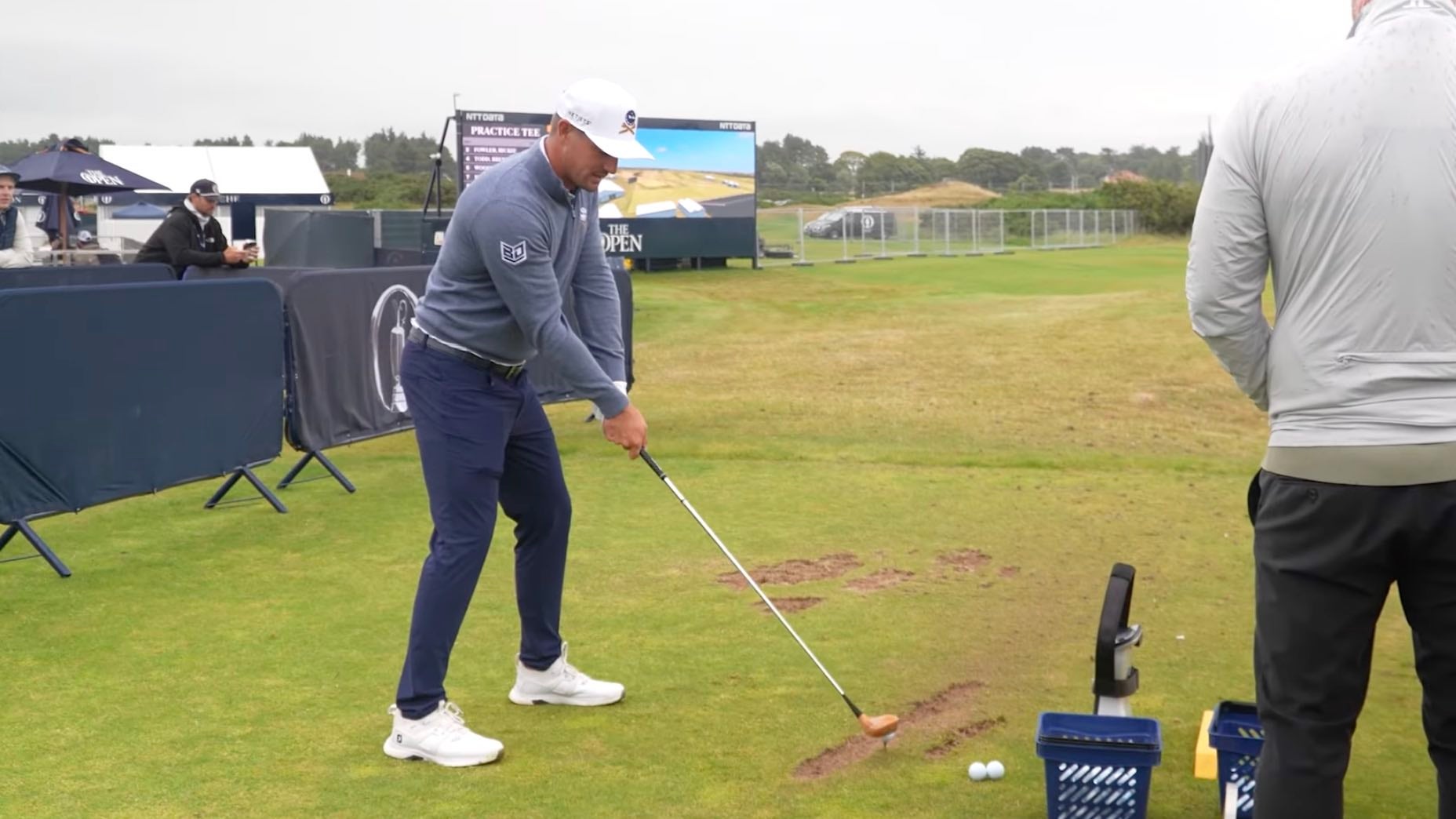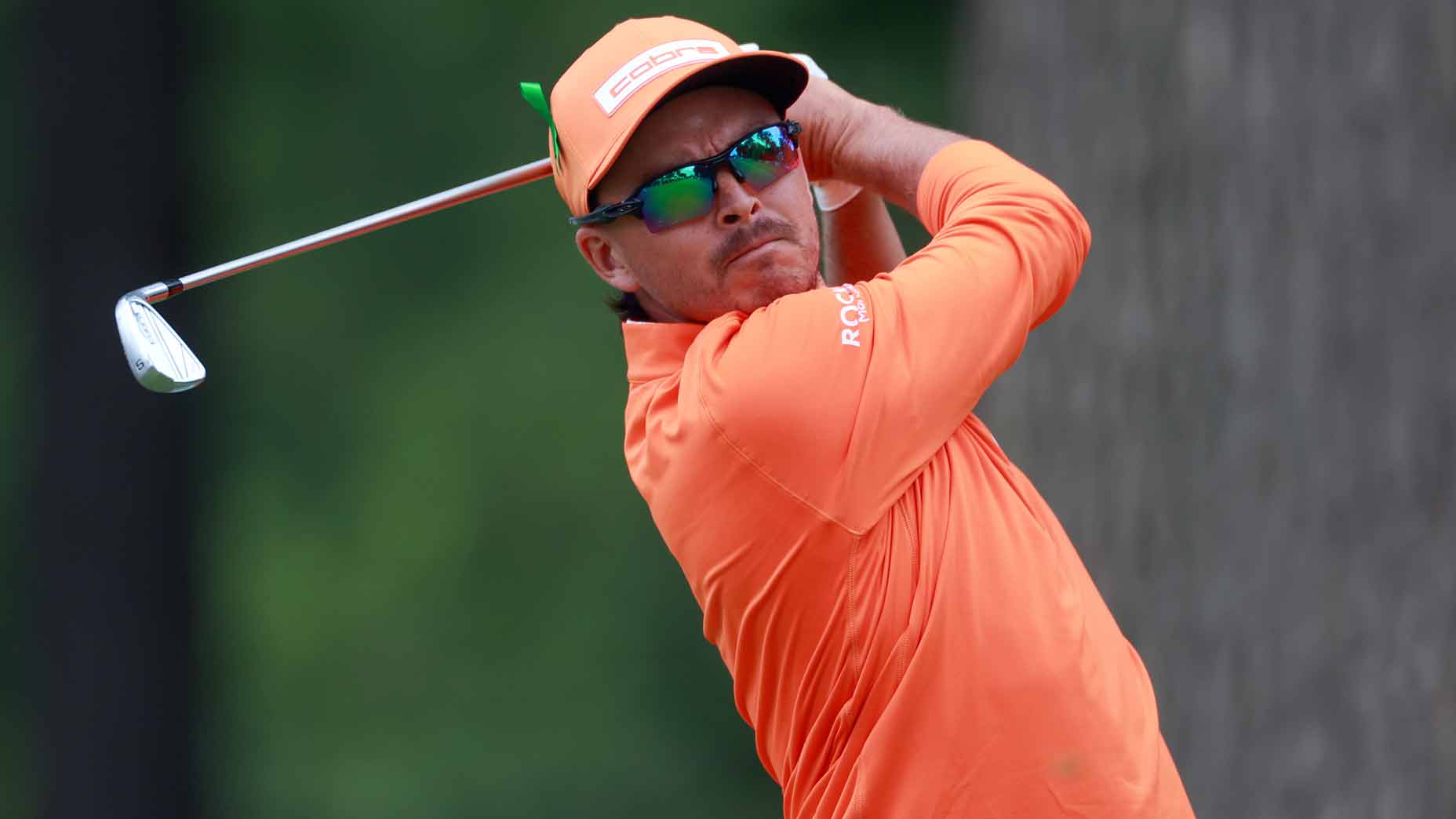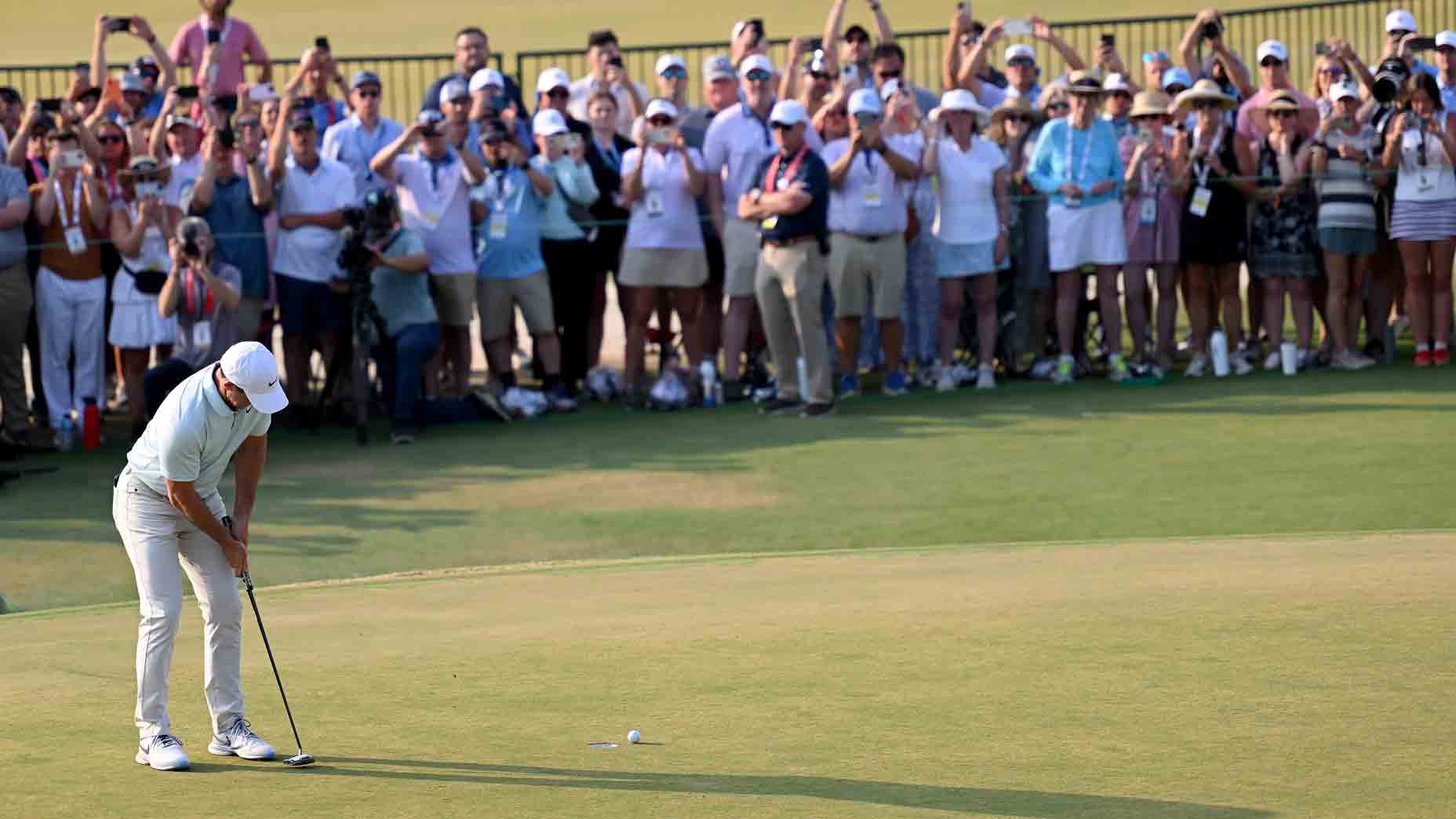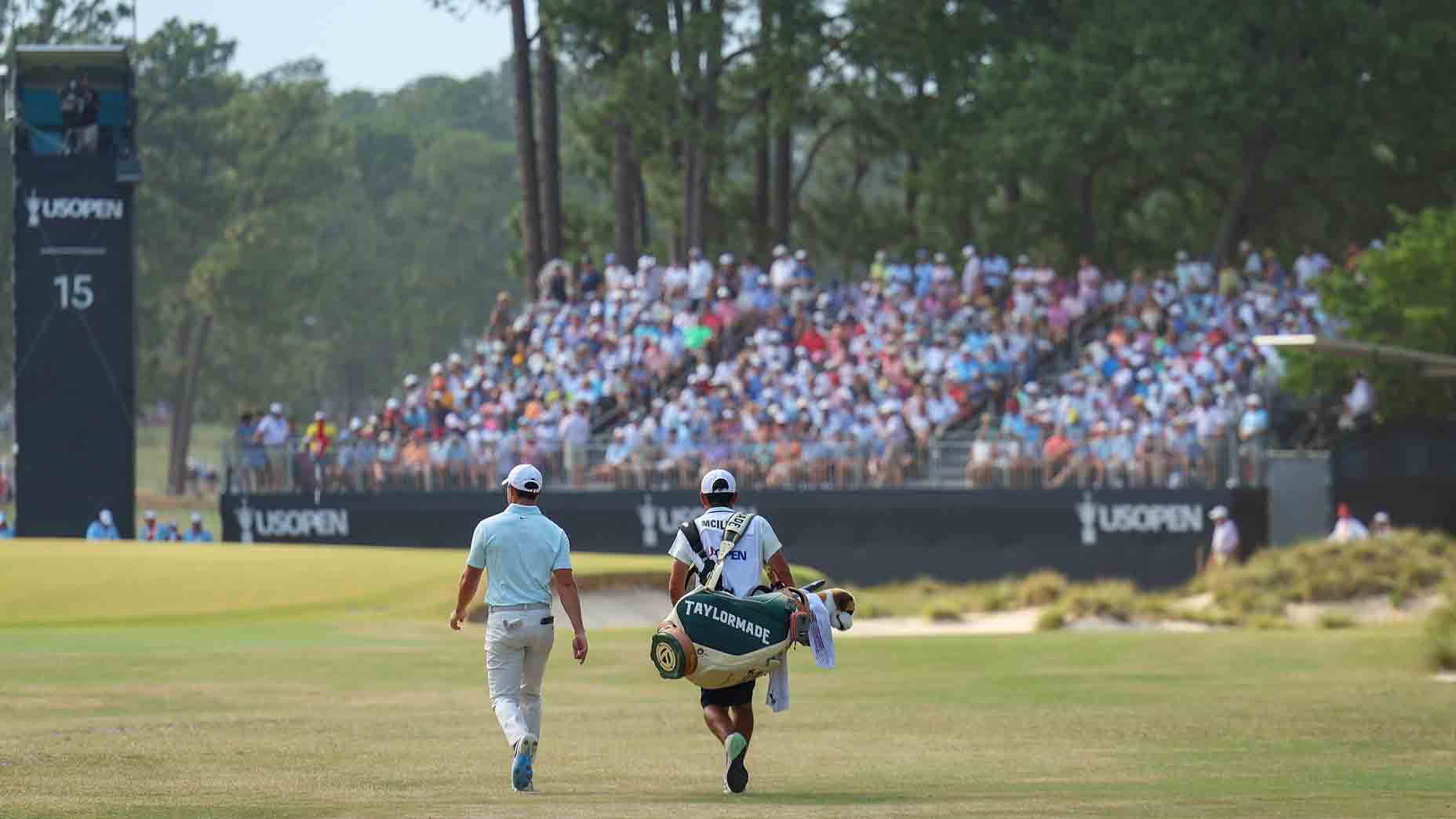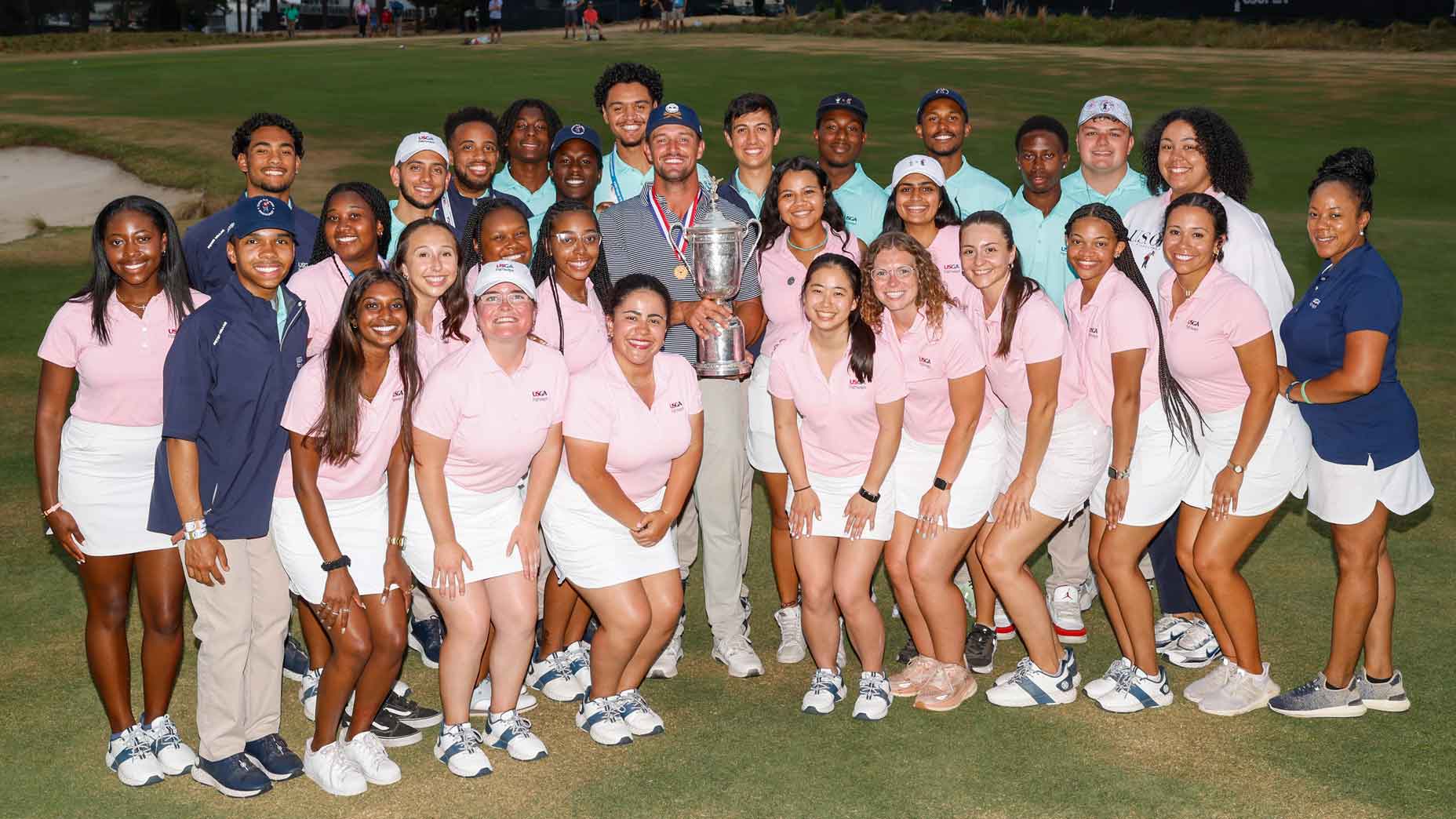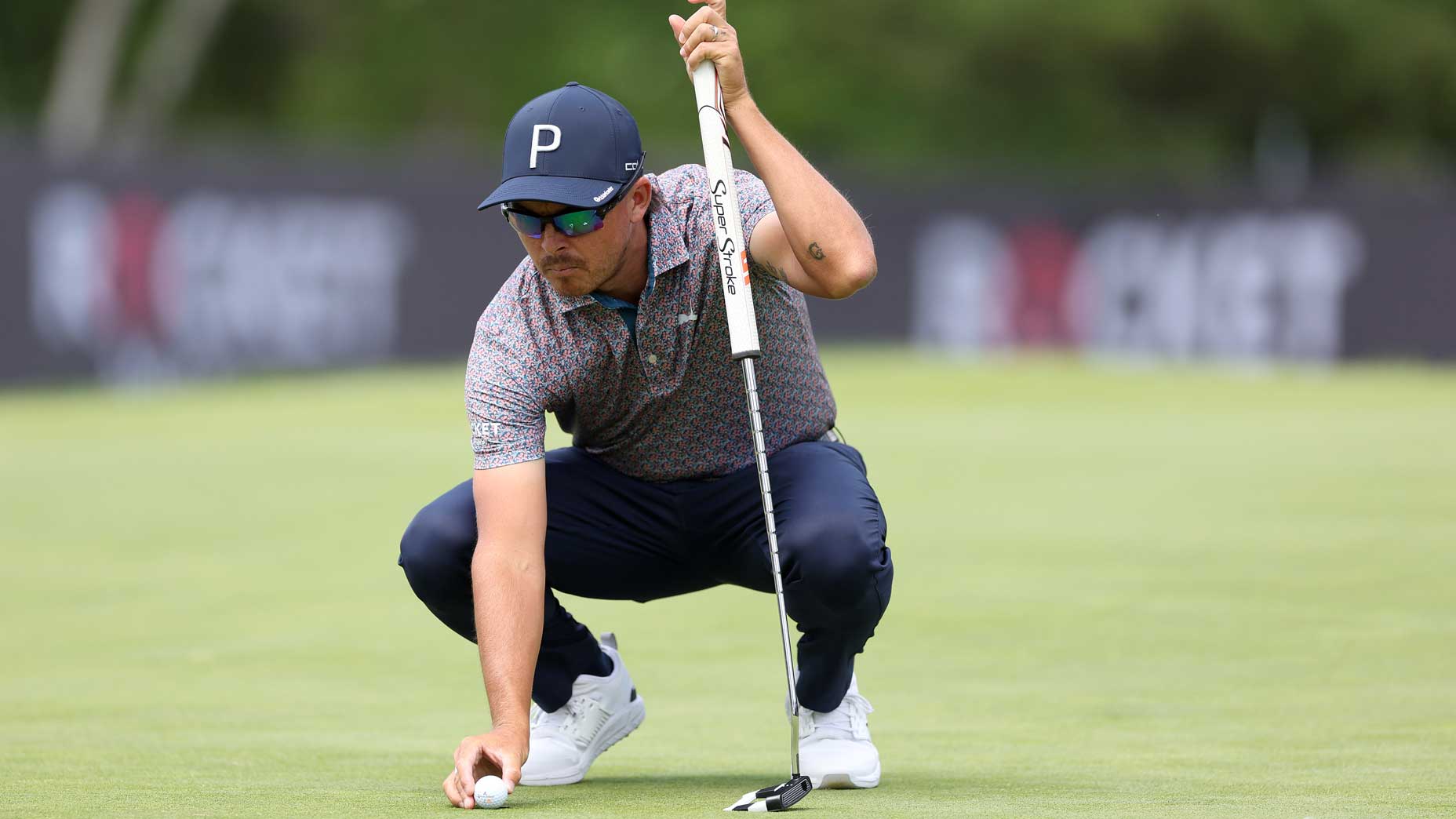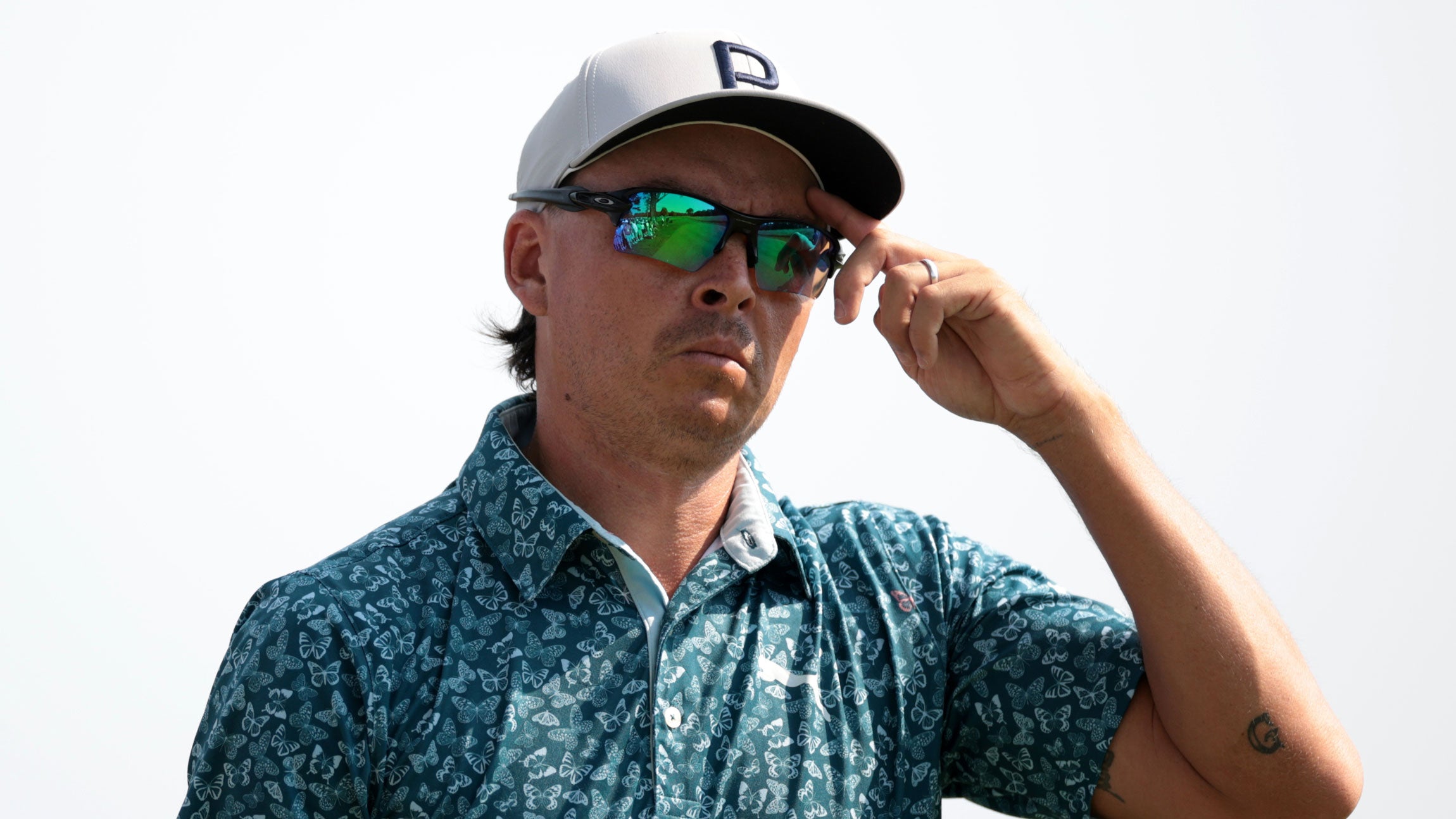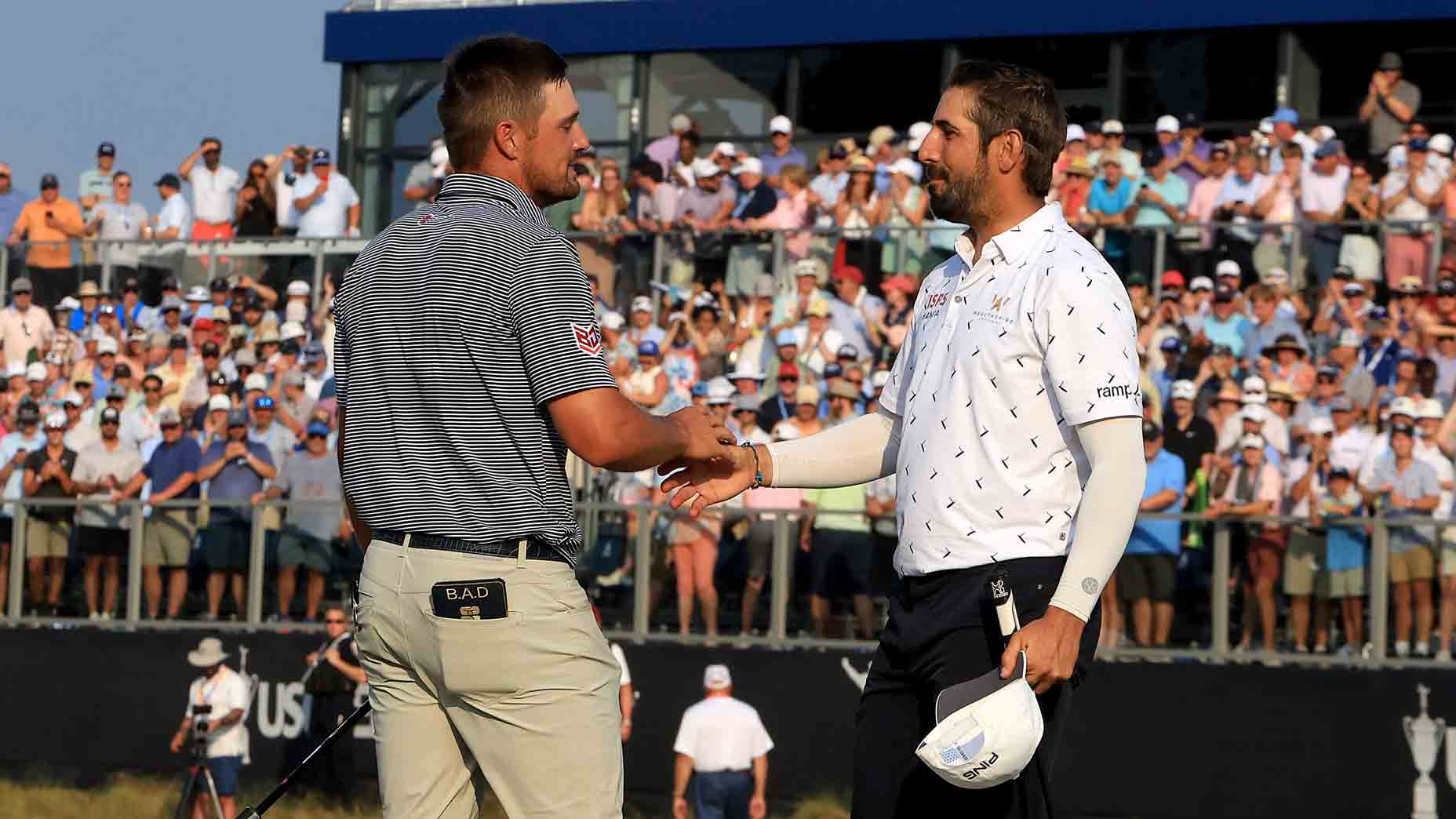Rickie Fowler’s gesture on 18 told us something his golf game couldn’t
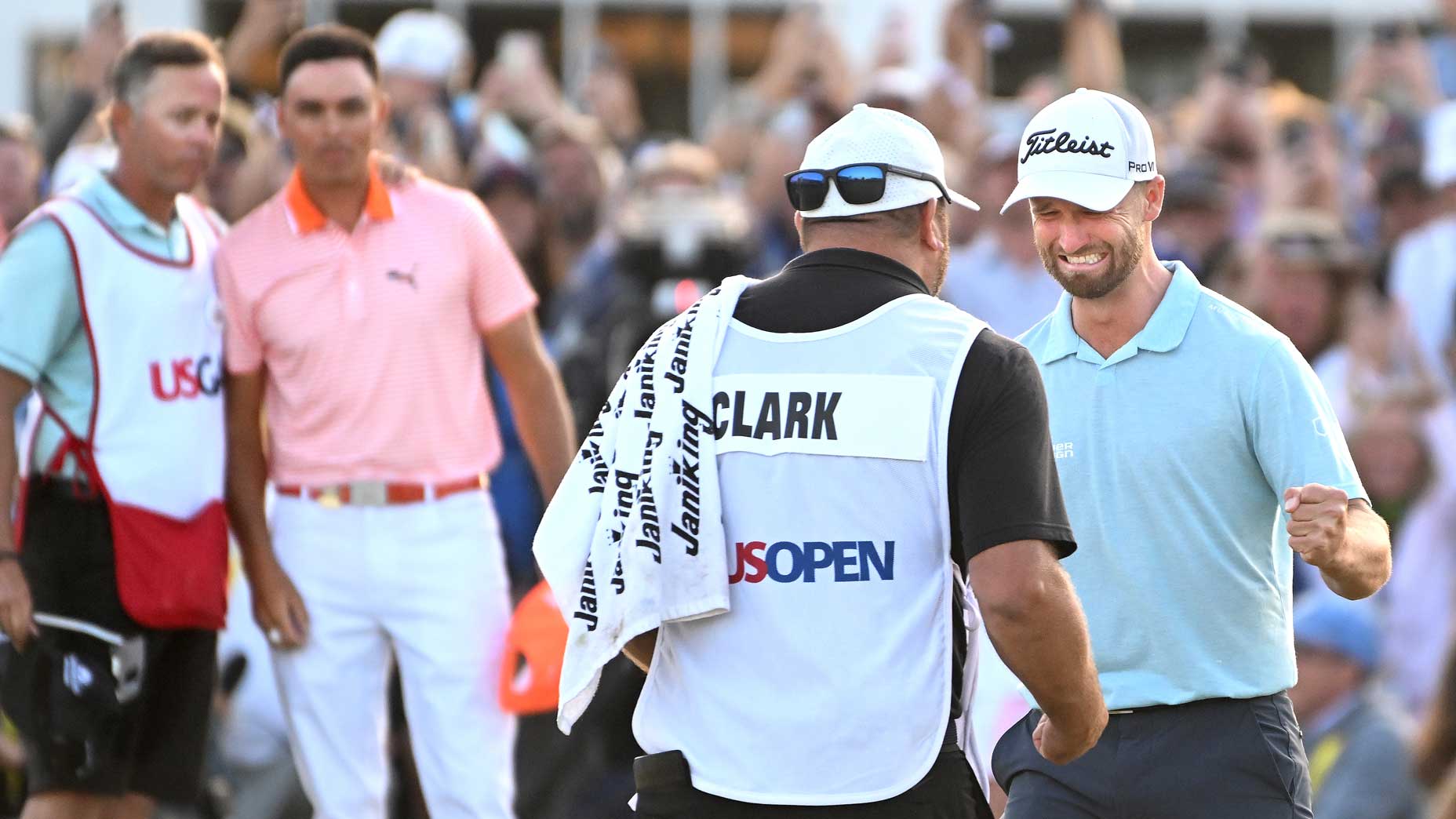
Rickie Fowler entered Sunday tied with Wyndham Clark but finished the day five shots back.
Getty Images
LOS ANGELES — As the final putt dropped and the U.S. Open concluded and the crowd exploded, one man stood still.
Some 30 feet away, Wyndham Clark raised his arms in triumph. He began bawling before the ball settled in the bottom of the cup. A cameraman arrived by his side, and then another, and then another. Clark buried his face in his hat for a moment, hiding his tears from the world, but when he uncovered his eyes the world had come to him. All week the Los Angeles Country Club crowd had been critiqued for a lack of energy, but now the green was surrounded by a group of marauders that had snuck under the ropes and charged up the fairway. They roared their approval for golf’s newest major champion.
Rickie Fowler watched the celebration from the back of the green, hat in hand and smile on face. After a couple minutes with his friends and family, Clark ran out of people to hug and turned to walk toward the back of the green. That’s where he found Fowler, who welcomed him with open arms.
Fowler pulled Clark in tight, yelling his congratulations. And then, just before they walked away, he leaned in for a quieter message.
“Your mom was with you. She’d be very proud,” he said.
After signing his card and hugging his wife and scooping up his daughter — who was wowed by the crowd but seemingly unaware of the specifics of, say, her father’s 72nd-hole bogey — Fowler walked around a corner and up the steps to the interview room. Runner-up Rory McIlroy had just vacated the podium and many members of the press had snuck off in pursuit of Clark and his winner’s speech.
After the first round, in which Fowler fired a U.S. Open-record 62, he’d faced a full house of reporters. After his second and third rounds Fowler had held the tournament lead, so he’d faced full houses then, too. Now? Most members of the media were off hoping for a glimpse of his victorious playing partner.
Fowler looked out at the near-empty room, flashed a grin and delivered a line, deadpan.
“Where’s everyone at?”
Fowler’s proximity to victory might seem like it’d be pure pain. A final-round five-over-par 75 might seem that way, too. This was his tournament to win! This was the tournament that would change everything! But Fowler chose to describe the week as progress — and it seemed like he meant it when he said it, too.
It’s easy to see why. A year ago, Fowler was at the U.S. Open, too, but he didn’t get to play. The World No. 145 had nearly made it through Open Qualifying but had settled at first alternate, which meant he trekked to Brookline, played practice rounds, prepped his game and waited around all Thursday. He even took a break from the day’s wait to talk to a group of USGA interns. And when he didn’t ultimately get to tee it up, he said there was “a lot of good stuff” to take away from the experience. This was relentless positivity on display.
From the outside, his situation didn’t seem so obviously positive. Fowler had made a name for himself early in his career for his major-championship play; his four top-fives in 2014 was an incredible feat and he’d logged five more major top-10s in the years since. But that first-alternate wait came in the midst of a stretch in which Fowler missed four out of seven major championships. When he finished last year’s PGA Championship, some people wondered if it would be his final major ever.
What did it mean, then, that he was in the final pairing just one year later?
“I definitely think we’re heading the right direction,” Fowler said. “The last 10, 12 months has been great. I’m heading the right direction, and we’re still going forward and up.”
That’s an understatement.
Fowler admittedly didn’t have his best stuff on Sunday. His 75 was the fourth-highest score of the day, pushing him from tied for first to a three-way share of fifth. He didn’t have control of his irons, losing nearly three strokes to the field on approach. He began the day dreaming of a maiden major championship, but six holes in he was suddenly four shots back of Clark. By midway through the back nine he knew that ship had sailed.
Still, T5 in a major is worth a lot more than nothing. There’s the check for $738,934, of course. But more importantly the showing vaults Fowler to No. 35 in the world. It earns him valuable Ryder Cup points. And it cements the fact that he is, once again, a fixture in golf’s upper crust. For McIlroy, Sunday was win or bust. For Fowler? There was plenty to be gained by getting this close.
“I enjoyed it,” Fowler said, summarizing his tournament. “You learn from all your experiences. Not the position I wanted to be in after today, but a lot of good coming from this week.”
I walked with Fowler’s group for much of the day. I was interested that I never saw a hint of frustration nor rage. Not after a crushed chip-shot at No. 2. Not after a three-putt at No. 5. Not after a blocked tee shot at No. 7. Fowler cited a walk down the 16th hole as the moment he realized his chances at winning had officially evaporated. I happened to be alongside him on that walk and he was inscrutable, emotionless and motionless save for the swinging of his oversized water bottle.
That’s consistent with the version of this man we’ve seen over the last couple years. Even when Fowler spoke about his struggles he never let on that they’d shaken his core nor imperiled his psyche. We knew, intuitively, that it couldn’t be that simple. There must have been moments. Like, say, when he watched the 2021 Masters alongside an injured Tiger Woods in Jupiter, or when he watched the 2021 Ryder Cup from home, or when he slipped from the top 100 in the world. You don’t go from a fixture atop the game to an also-ran with an uncertain future without accumulating a little scar tissue. But in spite of (or perhaps because of) how much time he spends in the public eye, Fowler remained cloaked in an air of unknowability.
If there’s one word casual golf fans might use to describe Fowler, it’s orange. On Sunday, his head was adorned with a swatch of the color so bright it was hard to look directly at him. But the orange has always been misleading. Perhaps that’s the point; it’s easy to get lost in its highlighter brightness of and forget you don’t know all that much about the man beneath it.
Back to that gesture on 18, then. Rickie waiting to greet his winning friends on their final hole has become his trademark move. For Justin Thomas. For Jordan Spieth. For Tiger Woods. For Brooks Koepka. And so on. There’s always been an element of tragedy in Fowler celebrating others’ major accomplishments without getting to celebrate any of his own. He’s gotten some grief for that exact thing. But showing up for your friends is a fundamentally decent thing to do, regardless of your own standing. It was easier than ever to hug the winner on this Sunday, given Fowler was in the same group. But he went out of his way to make the moment with Clark — who has long looked up to Fowler — particularly meaningful.
Fowler has garnered critiques for being more flash than substance. But his Sunday was a reminder that you are what you do. His game wasn’t enough to earn a U.S. Open title. But when he finished his media obligations he headed to the same place he’d gone after the first round, and the second round, and the third round, too: the Autograph Zone. He signed and signed and signed until every kid there was satisfied with his work. There’s no faking it through lengthy autograph sessions — you either do ’em or you don’t.
Rickie Fowler didn’t leave LACC fully satisfied. But he went out of his way to make sure that others did. His golf game appears to be nearly all the way back. That other, more important quality never left.
The author (cautiously) welcomes your comments at dylan_dethier@golf.com

